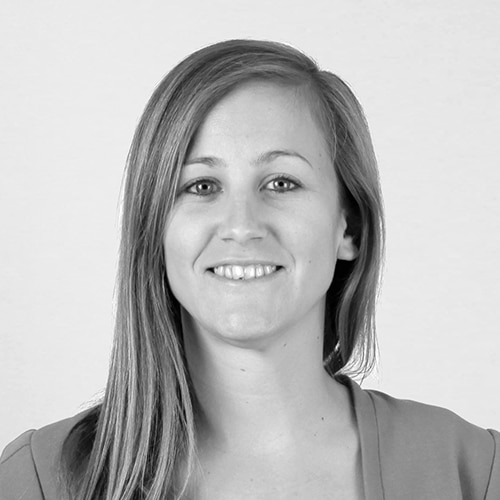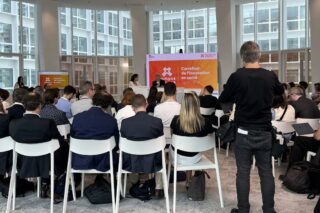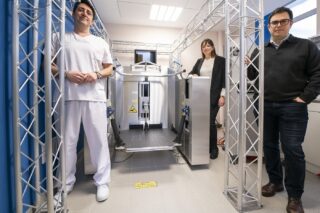The Materials Matter session at Arablab emphasized the importance of choosing durable, sustainable worktop materials, with Fundermax presenting its eco-friendly phenolic-based panels for modern labs.
September 24 – 26—The ArabLab event in Dubai, a key platform for laboratory professionals, hosted an insightful discussion on the importance of selecting appropriate worktop surfaces for laboratories. Entitled “Materials Matter: Choosing the Right Worktop Surfaces,” the session was led by Mr. Hubertus Burger Scheidlin, Head of Sales Business Development at Fundermax, a global leader in producing phenolic-based panels.
Mr. Scheidlin emphasized that while worktops might not have the high-tech appeal of laboratory machines, their contribution to a lab’s longevity and sustainability is critical.
“The longer your lab is usable, the more sustainable it becomes,” he remarked, underlining that the durability and quality of worktop materials directly impact the lab’s lifecycle and environmental footprint.
Fundermax, with its headquarters in Austria, stands out for producing worktops from phenolic compact boards, a material widely known for its resilience in laboratory settings. Unlike most producers, Fundermax takes pride in its in-house paper production, based in Norway. This paper, which constitutes 65% of the compact panels, is made entirely from recycled material—a unique feature that supports environmental goals and significantly reduces CO2 footprints.
“We are the only company in the world using 100% recycled paper in our core panels,” Scheidlin noted.
A Company Example of Eco-manufacturing
A recurring theme throughout the presentation was sustainability, a critical issue in today’s industrial landscape. Scheidlin defined sustainability as the ability to meet current needs without compromising the resources available to future generations.
Fundermax’s commitment to sustainability is evident in its efforts to minimize deforestation—its paper recycling initiative saves approximately 400,000 trees annually—and its reliance on green energy.
Currently, 85% of its production sites operate on renewable energy sources such as biomass, solar, wind, and hydroelectric power.
Beyond the environmental impact, the session also addressed practical considerations for worktops. Scheidlin illustrated how cheap materials often lead to rapid deterioration, showing an example of stained granite from a lab in India. He stressed that high-quality materials enhance the aesthetics of the lab and ensure its functionality over time.
Resisting Chemicals and Withstanding Extreme Temperatures
Fundermax’s worktops, designed for durability, are resistant to a wide range of chemicals and can withstand extreme temperatures from -80°C to 180°C. The company’s Max Resistance product, in particular, boasts a closed surface with no micropores, making it ideal for environments like medical labs, where contamination risks must be minimized.
These surfaces resist the growth of bacteria and fungi, ensuring compliance with stringent hygiene standards.
In addition to chemical resistance, Fundermax worktops offer excellent abrasion resistance, which contributes to their long lifespan. The company’s innovative use of a polyurethane-acrylic top layer further strengthens the surface, eliminating delamination, a common issue in worktops made from lesser materials.
Scheidlin highlighted that the company’s panels passed stringent SIFA tests, resisting all 49 tested chemicals—a benchmark for labs working with harsh substances.


Design Importance for Lab Spaces
The presentation also touched on the importance of design in laboratory spaces, with Fundermax offering a wide range of colors and finishes beyond the traditional black, white, and grey commonly seen in labs.
“People need to be in a pleasant surrounding,” Scheidlin stated, adding that the flexibility of Fundermax’s products allows for the creation of environments that are not only functional but also aesthetically pleasing.
In closing, Scheidlin provided a checklist for laboratory planners to consider when selecting worktop surfaces: chemical resistance, easy cleaning, impact resistance, and sustainability. He urged architects and lab designers to think holistically about their projects, integrating Fundermax’s wide range of panel options to meet both functional and design requirements.
Fundermax’s commitment to quality, sustainability, and design innovation places it at the forefront of laboratory worktop solutions. As Scheidlin concluded:
“If you design a lab like a Porsche, people will love to use it—even after 50 years.”
![[ArabLab] Materials Matter: Choosing the Right Worktop Surfaces](/wp-content/uploads/sites/9/fundermax-lab-surfaces-1000x537.jpg)










